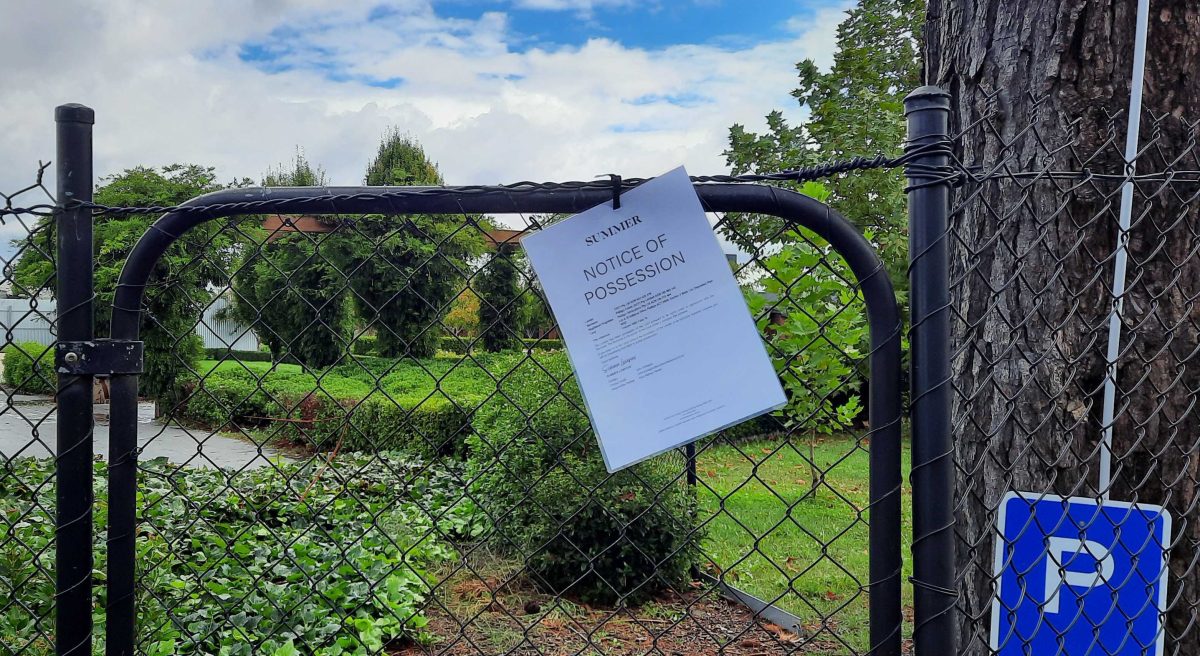
The gates were closed at Pialligo Estate on 24 March and the creditors may never see their money again. Photo: Ian Bushnell.
The Pialligo Estate saga continues.
The Pialligo Markets, one of 60 businesses under the Pialligo Estate Group umbrella, has entered liquidation. The creditors’ report shows an overall debt of $571,202 owed to 50 businesses, including $279,000 to NAB.
This follows the main restaurant and events venue which cited “difficult trading conditions” on 24 March.
The group, directed by John Russell, now owes $10.5 million to more than 500 creditors, including more than $4 million to the Australian Tax Office (ATO).
Earlier this year, it was also major construction firm PBS Building on 7 March, and then Braddon retail store POP Canberra on 5 April.
Data from the Australian Securities & Investments Commission (ASIC) shows insolvencies have risen over the past financial year, with 1234 businesses across the country entering voluntary administration over 2022-2023, and 1018 under court liquidation orders. This compares to 678 and 721 respectively across the 2021-2022 financial year. The vast majority lies in the construction industry.
So what’s going on?
Jonathon Colbran, partner of the National Restructuring and Recovery division at RSM in Canberra, says what we’re seeing now actually pales in comparison to the situation pre-COVID.
“I wouldn’t describe it as a spike in insolvency activity,” he says.
“Although there has been increased insolvency activity in the ACT, we are coming off a very low base and I’d suggest it’s more that some high-profile appointments have probably grabbed people’s attention.”

The Parks townhouses being built by PBS Building. Photo: Ian Bushnell.
ASIC data reveals 115 businesses in the ACT appointed external administrators over the 2022/23 financial year, 81 the year before and 90 the year before that. But these numbers are the lowest they’ve been since 2004/05.
From 2005 to 2020, the average number of businesses entering administration each financial year in the ACT was 139.
Mr Colbran says this year marks the beginning of a correction, largely led by a reduction in stimulus measures, more challenging economic conditions and a shift in debt collection policy by major creditors, including the biggest of them all – the ATO.
“During COVID, the Federal Government introduced a number of stimulus measures and legislative reforms to support businesses and taxpayers,” he says.
“This included a clear policy shift in the way the ATO was collecting tax debt. Almost overnight, we saw the ATO stop taking court action to bankrupt and liquidate businesses with unpaid tax debts.”
Over the course of 2020, the ATO granted almost 13 million extensions for lodgements and payments, alongside almost 700,000 payment plans tailored to individual circumstances.
Insolvency levels responded by dropping sharply. For example, the almost-5000 companies which appointed administrators over the 2021/22 financial year is less than half the number from 10 years ago when 10,757 sought external help. In the ACT, the 81 businesses of 21/22 compares to 149 a decade ago.
“The government then brought in stimulus measure after stimulus measure to support small businesses and individuals trying to navigate through difficult times,” Mr Colbran says.
More money coupled with debt they didn’t have to pay back meant many businesses ploughed on when normal circumstances would have folded them.

RSM in Canberra partner Jonathon Colbran. Photo: Thomas Lucraft.
But now the day of reckoning has arrived as the ATO attempts to recoup a tax debt approaching $45 billion. Throw in rising inflation and interest rates and many businesses are now facing a “death by 1000 cuts”.
“There is still a lot of goodwill in the community to support small business, but with the costs of production, labour and materials all increasing, all these different pressures are now bearing down on businesses that are struggling,” Mr Colbran says, noting the construction industry as particularly affected.
While it ensured thousands of small businesses made it through the pandemic, the softly-softly approach by the Federal Government has also had expensive ramifications for ordinary Australians.
Australian Restructuring Insolvency & Turnaround Association (ARITA) CEO John Winter says letting struggling businesses off the tax hook has meant more customers paying deposits to companies they presumed were coping fine, only to find they really weren’t.
“Many of these businesses now becoming insolvent are businesses that should have been shut down earlier,” Mr Winter says.

If the ATO had chased up Pialligo Estate sooner, the 100-plus customers probably would have saved their hard-earned money. Photo: Pialligo Estate, Facebook.
“The ATO has far more information on the performance and viability of a business than anyone else, and if they don’t bother to take action and shut down a business that should be insolvent, that business will continue to rack up debts to others.”
The end result is enormous amounts of owed money. And with employees and the ATO taking first dibs, it’s the others who are left out.
“The mums and dads who paid deposits often aren’t going to be paid back.”



















